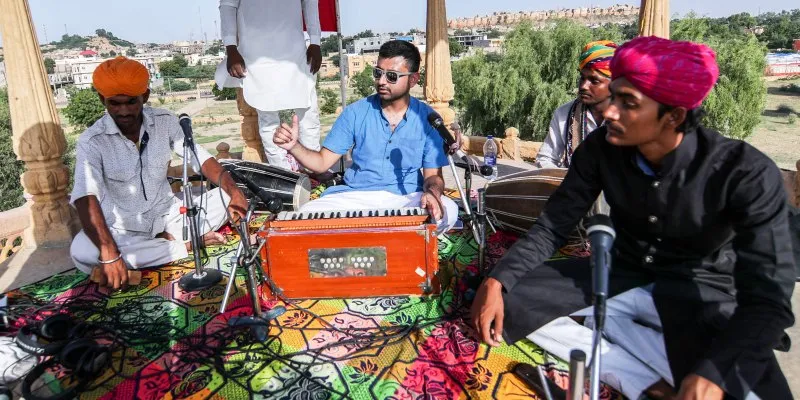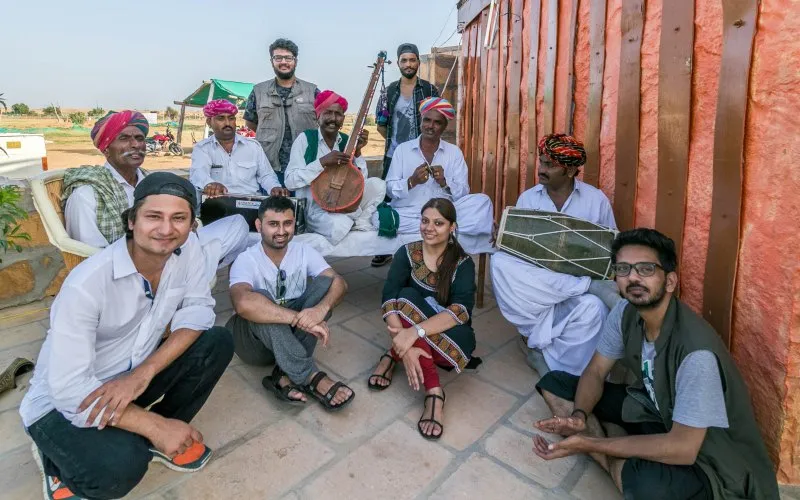26-year-old works to preserve and promote India’s folk music
With Anahad Foundation, Abhinav Agrawal is using technological solutions to ensure recognition, preservation and evolution of Indian folk music.

Enriched over millennia, Indian folk music is apart by its vast cultural diversity. With simple instruments and symphonies created by the earthen voices of people singing in unison, these songs celebrate nature, love, happiness, loss and the human condition.
At a time when electronically generated rhythms are overtaking folk traditions, Abhinav Agrawal (26) started Anahad Foundation, an NGO that works towards recognising and preserving the evolution of classical and folk music of India.
The journey of a music lover
Abhinav has been playing the tabla since he was four years old. Folk music always entranced him; he loved how it kept nature in focus. He went on to complete an undergraduate course in green architecture from School of Planning and Architecture, Bhopal. But his love for music grew and Abhinav earned a Prabhakar degree, in tabla as well as vocals from Allahabad Gharana.
He started Anahad Foundation in 2013, but quickly realised that he was inept at managing a full-fledged organisation. He was neither trained/knowledgeable on how to run an organisation, nor did he have anyone to help. To overcome this gap, he enrolled into Berklee College of Music, Valencia, and got a master’s degree in music business.

The beginning of Anahad
After his graduation, Abhinav decided to travel across India, visiting tribal villages and learning about their music.
“I had visited the Kalakar Colony in Jaisalmer. It was a musicians’ colony and when I entered, I could hear music emanating from every corner. I was invited into many homes, one of which belonged to a musician named Hariram Bhopa. He handcrafted a traditional instrument of Rajasthan, the Ravanahatha. He showed me how he made the instrument and we started jamming together as I had my guitar.”
He adds, “We were soon joined by others who got their own instruments and we continued playing music for a good three hours. It was so reviving. I had no money to give them because at that time as I was unemployed. But I realised that I could help them. I wanted to provide them with opportunities - quality services to record their music and reap the benefits - and bridge the gap between the rural and urban genres.”
In November 2016, Abhinav gathered people who were willing to help, travelled to tribal villages with a mobile studio recording system and began recording their work. After ensuring that the music was original, it would be converted into a digital format, with copyrights to the composer. A website would be made in their name and the music video would be put up on it, using which music producers could learn of them and their talent. A handcrafted box with the CDs, business cards, website in a printed format and pen drives were given to the owners for future endeavours. To ensure that the music was documented in a proper format, music scholars from all over the world were invited to study this music.

Fine-tuning the plan
The recorded songs will be released worldwide and the royalties generated through streaming and selling will be used for further documentation.
“When I first began recording, people would beg me to not steal their music. They had been cheated so much, it was difficult for them to trust me. That is why one month after I recorded their music, I got back with boxes of their documented work and business cards. This was the biggest difficulty I faced and I’m glad that today the people trust me, they greet me with much joy and respect,” Abhinav says.
Anahad is incorporated in Delhi but the work is done from Greater Noida. The organisation has two directors along with Abhinav - Shuchi Roy and Satyam Sangwan, and have successfully completed 20 national collaborations with the help of volunteers, chosen through a volunteer trip organised every two months. Applicants can apply from Anahad’s website; five are chosen to accompany the team on a field trip completely sponsored by Anahad.
Anahad has also done an international collaboration, Machali, with David Minguillón, Brail Watson, Patris Fuxova, Daniel Tauber, Johnathan Lee, Shruti Kumar and Sahana Kumar. The folk song is about a famous tigress of Ranthambhore National Reserve, named after the fish-shaped mark on her face. The intention behind the musical project was to bring forward unheard tales of bravery of Machali in a contemporary way with the soul and flavour of original Rajasthani folk.
Plans for the future
The organisation plans to invite international producers to collaborate with tribal artists to produce one song. To accomplish this, Anahad is organising a music festival next year – the Equals Music Festival will be held in Jaisalmer Fort.
By 2020, Anahad aims to raise the economic livelihood of 30 tribes in three underprivileged musical communities of India by 70 percent. Next year, they plan to work in Northeastern states, primarily Assam and Arunachal Pradesh.
“Folk music is the melody of the human soul. It talks about the happiness, celebration and positivity amid trouble. Till the human soul is alive, folk music will flourish,” Abhinav says.











